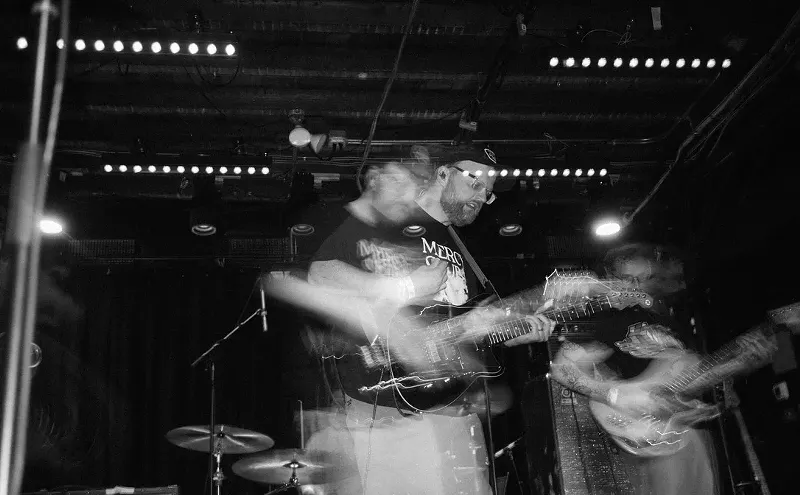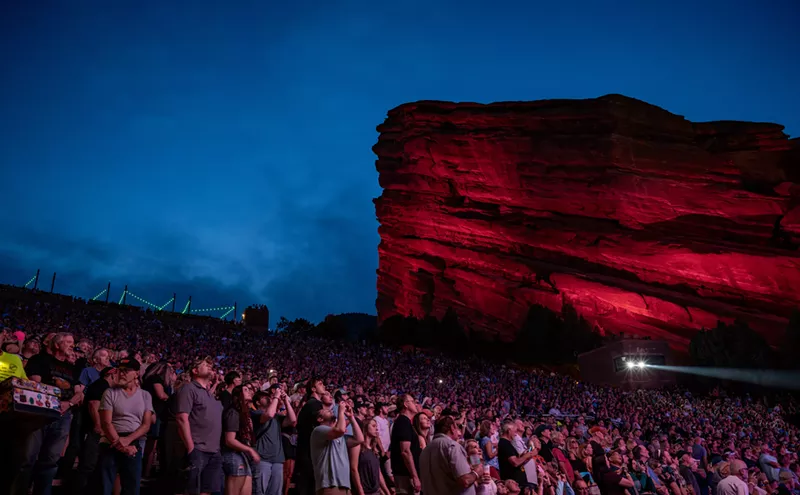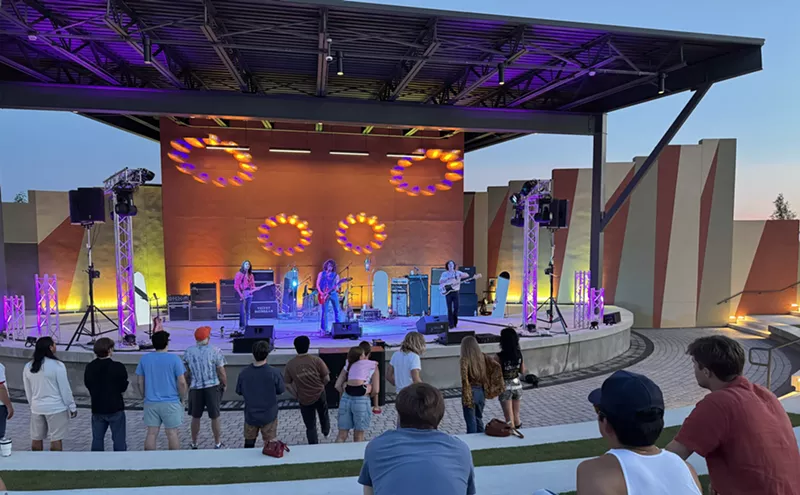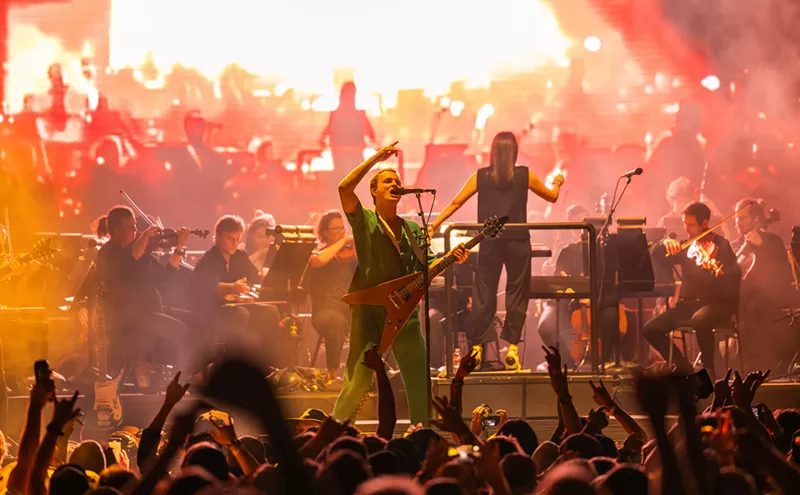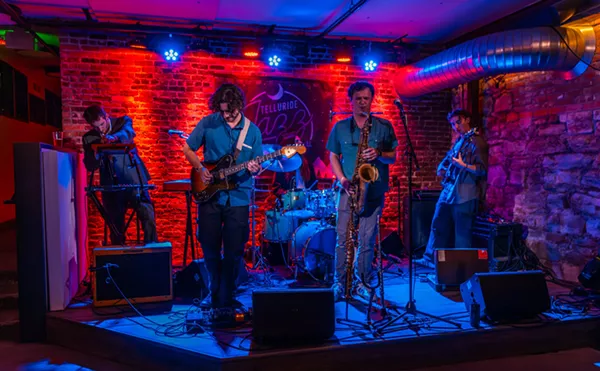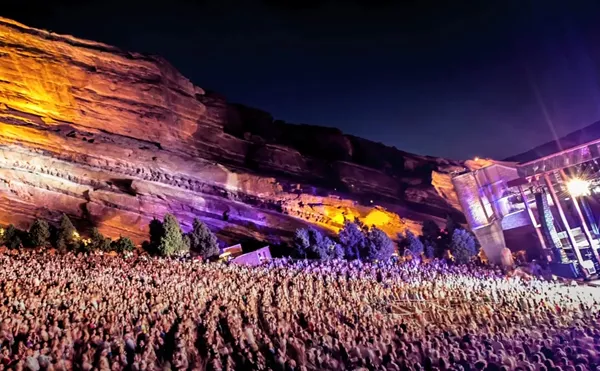A church service is scheduled to begin at 6:30 p.m. on the first Friday of October at Church in the City-Beth Abraham, at the corner of Gaylord Street and 16th Avenue, and about forty worshippers have gathered in the main sanctuary. But this will not be a traditional church service. There are no dresses, ties, starched shirts or shined shoes to be found among the congregation; most people are wearing T-shirts or hoodies. Nor will there be any hymns or church organs heard throughout the evening.
Instead, everyone’s here to get down to some hip-hop.
Since 2011, the Hip Hop Church of Denver has been using rap performances and breakdancing to spread the Word. Along with the Hip Hop Church L.A. and programs at the Sanctuary Covenant in Minneapolis, it’s part of a small but growing rap-ministry movement in the United States. Even while hip-hop is maligned by some Christians, who consider it sacrilegious, more churches are opening up to the genre as a creative way to spread the Gospel. Hip-hop churches also provide a space for gospel hip-hop artists to perform, and Denver has its own dedicated community of Christian artists who are trying to reach youth and marginalized communities through their lyrics.
“We gonna set it off!” exclaims Roy Dockery, himself a Christian rapper and one of the organizers of the event. He begins the service with a short prayer: “We hope that you bless every performer and help them spread your word. In Jesus’s name, we pray. Amen.”
An Aurora-based group called Soldiers for Christ takes the stage, featuring an MC named Shocace and two female backing singers named Lady Peal and Purpose. They begin their set with a song called “Spiritual Warfare.”
Vintage ’90s synth sounds fill the air, and the two backing singers sway on the balls of their feet at either side of Shocace as they wait for the beat to drop. When it does, it’s surprisingly hardcore, like old East Coast hip-hop…only the lyrics are all about Jesus.
Out in the audience, which is mostly African-American, young kids run circles around clusters of chairs, ignoring the music while their parents bob their heads along to the beat. Shocace’s rapping is good. As the song progresses, the crowd becomes increasingly absorbed until the atmosphere feels as spirited as that of any Southern Baptist service.
When the song ends, a guy yells, “AMEN!”
Then there are cheers of recognition when the second act, an MC named Hayward, is announced.
This time the musical style changes to trap, with the double-time cymbal hits and Southern-rap stylings of Lil Wayne. Again, it almost seems dirty — until you listen closely to the lyrics. At one point, a group of five audience members forms a dance pit in the center aisle.
Another artist, BrandonJ, gets the crowd doing Eminem’s signature arm wave — the Slim Shady Chop.
“Lemme hear you say, ‘Go, Jesus! Go, Jesus!’”
“Go, Jesus! Go, Jesus!” the audience echoes.
Toward the end of the song, some in the crowd begin to turn their attention away from the stage, distracted by a commotion in the back of the room.
When BrandonJ finishes the song, he announces, “Finally, we got the original man in the house!”
The Pastor has arrived.
Mike Pennington, who goes by the name Pastor Mike Devine, is the creative force behind the Hip Hop Church of Denver. At 48 years old, he’s an easygoing man, with strong arms and a bald head. “Pastor” is not just part of his stage name; he’s also a Colorado-registered minister who can officiate at funerals, weddings and baptisms.
And he’s got a mean flow.
As it turns out, Devine found hip-hop before he found Jesus.
“I was wayward. A problem in school. A problem in the streets,” he recalls of his upbringing in Miami. “But rap was always on my mind — that’s all I wanted to do. I was known as ‘the rapper boy.’ My freestyle was tight!”
Hip-hop influences were all around him during his youth. One neighbor in his childhood apartment complex was a DJ from New York who used to babysit Devine and taught him how to rap and dance. Later, in high school, Devine made friends with the members of Miami gangsta-rap collective 2 Live Crew, who in 1989 were famously banned from selling their album As Nasty As They Wanna Be in Florida record stores by a federal district judge on the grounds that it was obscene. (The ruling was later overturned in the 11th Circuit U.S. Court of Appeals.)
At the same time, however, Devine became involved with drugs, and during high school, he says, he was investigated by law enforcement agents for a hack he learned that extracted credit from prepaid phone cards.
He was nearly indicted for credit fraud, and says that the experience of almost getting locked up was what convinced him that he needed to change his life. “I knew I had to get away from all that,” Devine recalls.
That was when he decided to turn to Christ. But he didn’t want that to also mean turning away from hip-hop, so he’s worked tirelessly for more than two decades to combine the two.
Beginning in the early ’90s, Devine began experimenting with a rap ministry — first in Miami and then in Dallas, working with gang members and at-risk youth, whom he calls “dangerous minds.” After translating sermons and Bible passages into rap, Devine would perform at school and prison assemblies. It was an unusual concept at the time, and Devine gained attention, resulting in an invitation to perform on the Arsenio Hall Show in 1992.
He even claims to have influenced Tupac.
According to Devine, shortly before the famous rapper’s death, he helped convince Tupac to leave the thug life by writing personal letters to him when he was serving time for sexual-abuse charges in New York’s Rikers Island prison.
“People said that [Tupac] was never going to change. I didn’t believe that, so I started writing to him,” Devine remembers.
While Devine never actually received a written response, he says he knows that Tupac was reading his letters because the rapper later made statements in TV interviews that were similar to what Devine had written to him. Especially, Devine says, when Tupac told an MTV reporter, “I’m not saying I’m gonna change the world, but I guarantee that I will spark the brain that will change the world.”
“Those are my quotes!” Devine claims. “I even had people call me ‘the spiritual mentor of Tupac Shakur.’”
Regardless of whether Tupac really was influenced by Devine, there are plenty of other people who have been, including Roy Dockery, his assistant organizer in Denver. Dockery also works with Aurora-based production company On Faith Entertainment.
But the path to Devine’s goal of merging ministry with hip-hop hasn’t been an easy one. During the past 25 years, he’s faced opposition from traditional church authorities, such as when administrators at Miami Christian College told him, “You can’t come into this school if you do that.”
“When I first started bringing rap into the church [in 1992], they didn’t like it,” Devine says. “They said it was really not sacred or holy to do that. The church had a bad taste with what they saw in the music from groups like N.W.A.”
Dockery puts it this way: “It’s a cultural thing that creates the tension between church and hip-hop. Each has a distinct way they dress and act and speak.”
Despite the roadblocks, Devine pushed forward with his hip-hop ministry. He moved to Denver in 1995 after passing through town on a road trip to California, and says that he felt God tell him to settle in Colorado. In 1997, he established a local nonprofit, Reality Rap Ministries, and for nine years hosted assemblies and workshops around metro Denver, including an event at East High School for which he convinced Christian hip-hop artist Lecrae to perform.
But things took a sharp turn in 2006, when Devine’s nineteen-year-old son, Devon Sutton, was murdered in Miami. The teen was shot in the head when a fight broke out after a high-school dance.
For Devine, it felt like a rug had been pulled from under his feet. He tried to continue preaching, but his heart wasn’t in it anymore. He felt beaten, and decided to change careers by studying music-business law at the Community College of Denver.
“I got really depressed,” Devine says.
Five years passed, and one day Devine had an eye-opening experience that convinced him to go back to preaching. While waiting at a bus stop at Havana and Colfax, Devine struck up a conversation with a man who turned out to be a gang member. At one point in the conversation, the topic shifted to Tupac, and the gang member mentioned that he believed Tupac’s lyrics were meant to show how the Church takes advantage of people. Devine disagreed, especially given his own alleged history with Tupac’s spiritual awakening.
For Devine, the conversation was an epiphany, “like God was calling on me to start a church to help guys on the street like this.”
So in 2011, he decided to leave his studies at CCD and start the Hip Hop Church of Denver. It began as a small gathering, originally held in a tiny room at Emmanuel Christian Center in Aurora, but steadily grew over time to include 100 regular attendees. Recently, the services were moved to Church in the City, where Devine hopes to re-establish his congregation.
He certainly has more support this time around: Now there are other hip-hop churches in the country to consult with, not least of which is the Hip Hop Church L.A., whose leader, longtime rapper and producer Kurtis Blow, is advising Devine.
Dockery sees a lot of potential for Denver’s hip-hop church. He points to the fact that, in 2015, churches are becoming less traditional, and therefore more open to experimentation. “It’s way different than when I was growing up. Now that people are more relaxed and focusing on the spiritual aspects of religion; it’s allowing more places to perform,” he says.
And hip-hop has become more mainstream in the past two decades. “You have these smart, conscious rappers like Talib [Kweli], Mos Def and Common,” Dockery points out. “So now you have media saying that hip-hop can be positive.”
All this, Dockery believes, works in the Hip Hop Church of Denver’s favor.
At the early-October gathering, the crowd cheers when the Pastor arrives. BrandonJ hands off the microphone to Devine, who immediately launches into a freestyle rap. The audience claps along to provide a steady beat.
“Yeahhh, Mike Devine!” someone yells.
It turns out that the reason Devine has arrived late, after the first three performers have already finished their sets, is because his car was struck in a hit-and-run in Westminster. Still shaken from the incident, Devine includes the anecdote in his sermon, along with recitations from the Bible: Acts 15.
“So I don’t think the accident was no accident — just like how in Acts, Paul and Barnabas didn’t know how God was gonna move,” Devine says.
In many ways, Devine’s experiences over the past 25 years have been equally unpredictable, but some things have worked out. After all, when he first started to rap-preach, he had to search the country for places that would allow him to perform. “Now, I can find ten places in just Aurora,” he says.
“My goal is to keep reaching back into the community, to reach less fortunate people,” he says. “And with hip-hop, we’re going to keep being relevant to the culture.”
The Hip Hop Church of Denver services are held at 6:30 p.m. on the first and third Friday of each month. Learn more at hiphopchurchdenver.com, and see our full slideshow by Ken Hamblin.

Audio By Carbonatix
[
{
"name": "GPT - Billboard - Slot Inline - Content - Labeled - No Desktop",
"component": "23668565",
"insertPoint": "2",
"requiredCountToDisplay": "2"
},{
"name": "STN Player - Float - Mobile Only ",
"component": "23853568",
"insertPoint": "2",
"requiredCountToDisplay": "2"
},{
"name": "Editor Picks",
"component": "17242653",
"insertPoint": "4",
"requiredCountToDisplay": "1"
},{
"name": "Inline Links",
"component": "18838239",
"insertPoint": "8th",
"startingPoint": 8,
"requiredCountToDisplay": "7",
"maxInsertions": 25
},{
"name": "GPT - 2x Rectangles Desktop, Tower on Mobile - Labeled",
"component": "24956856",
"insertPoint": "8th",
"startingPoint": 8,
"requiredCountToDisplay": "7",
"maxInsertions": 25
},{
"name": "Inline Links",
"component": "18838239",
"insertPoint": "8th",
"startingPoint": 12,
"requiredCountToDisplay": "11",
"maxInsertions": 25
},{
"name": "GPT - Leaderboard to Tower - Slot Auto-select - Labeled",
"component": "17676724",
"insertPoint": "8th",
"startingPoint": 12,
"requiredCountToDisplay": "11",
"maxInsertions": 25
}
]


